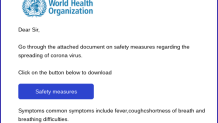There's a lot of fear about the coronavirus and scammers are picking up on it. New email scams that prey on people's fears may be heading our way.
"Folks looking to do bad things or looking to take advantage of the situation will use these headlines," said Mark Ostroski with Check Point Software. "It's tied to fear."

As of March 11, more than 1,100 cases of the coronavirus had been found in the U.S. as the virus continues to spread. Check Point has already found several hundred suspicious websites about the coronavirus.
"These folks are targeting areas that have the most increased pulse of activity," said Ostroski. "People either panicking or seeking information would click on the attachment and then download malware."
This has already happened in Japan. Ostroski said an email went out that looked like it was from health officials, but instead had a document with a virus hidden in it.
"The attachment was supposed to be information about the outbreak and what to do," said Ostroski. "But as soon as the person clicked on the link they were immediately compromised."
Local
The emails and websites may also advertise hard-to-find face masks or hand sanitizer but instead will take your personal information.
There are several ways to stay safe:
- Use common sense: if something sounds too good to be true, it probably is.
- Don't click on unknown links or attachments: instead, go to a search engine and try to find the information or product that way.
- Do your research: before buying from a questionable website, see if anyone has written about the company before.
- Go directly to official websites: the best place to find information is at www.CDC.gov and www.SanDiegoCounty.gov.



